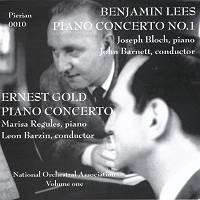
Intense style
Gold and Lees
piano concertos -
reviewed by
RON BIERMAN'... a thoroughly convincing performance.'
|

|
The Pierian Recording Society is a non-profit organization devoted to improving the sound of valuable historical recordings, private or commercial, and then issuing them on CD. Examples to date include one of Granados as a pianist and another that documents Ravel as both a pianist and a conductor. The present release extends the approach to concert performances of historical interest. Ernest Gold's only piano concerto was completed in 1943 and this performance was recorded in 1945. When I listened to it before reading the liner notes it struck me as similar in feeling to Bath's Cornish Rhapsody and other concertos written into the plots of films, though it is much longer than those works. When I did read the notes I realized I'd forgotten the name, but Gold was in fact a fine composer of music for films including On the Beach and Exodus. He won a Grammy for the latter. The notes also point out that a New York Times critic called the piano concerto 'undistinguished' largely because it reminded him of film music, even more of a pejorative at the time than it is now.
So be forewarned if you are allergic to the style. If you aren't, you may enjoy Gold's clear melodies and standard harmonies, and the piece is more substantial than I may have thus far led you to believe. I agree the sonata form beginning movement is 'undistinguished', but it does include an attractive theme, as does the song-like second movement [listen -- track 5, 4:01-5:15]. I suspect the Times critic was annoyed when the audience applauded after the movement to show its approval. The concluding rondo is lively and Gershwinesque. The main melodies appear in this excerpt [listen -- track 6, 0:01-1:32]. Gold uses a light fugato and then interludes Fred Astaire could have danced to before the rousing drive for home. Pianist Marisa Regules is an effective advocate throughout as is conductor Leon Barzin. The National Orchestra Association, a New York City training ground for young professionals, is adequate, but has occasional problems, including those of intonation. The monaural recording, in spite of substantial re-engineering effort, could be mistaken for something made earlier than 1945. The concert was originally captured on cassette and not even today's computer enhancement can do much for several bouts of watery piano and brass sound.
Continue >>
Copyright © 19 November 2003
Ron Bierman, San Diego, USA

|

